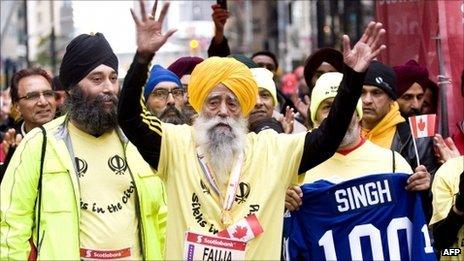Who, What, Why: How can a 100-year-old run a marathon?
- Published
- comments

Fauja Singh has astonished the world by running a marathon at the age of 100. The British runner completed the 26.2-mile Toronto Waterfront course in eight hours, 25 minutes and 16 seconds. So how was this feat of age-defying stamina possible?
Most of us would be grateful - and more than a little surprised - to be still breathing at 100. The idea of running a marathon at that age seems like something out of science fiction.
Mr Singh, who came 3,850th, but still finished ahead of five other competitors, puts his success down to not smoking or drinking alcohol, staying positive - and eating ginger curry.
But if that really was all there is to it, the streets would be filled with centenarian athletes and every retirement home would have its own athletics team.
Experts in geriatric medicine believe Mr Singh's record could stand for a long time.
Key to longer life?
Long-distance running is hard on the body - and the older you get the greater the toll it takes.
The heart becomes less efficient at circulating oxygen - an average 60-year-old pumps 20% less oxygenated blood than a 20-year-old.
Muscle strength also declines sharply once you pass 70, at a rate of about 30% per decade, according to some studies.
Your ligaments and tendons become more brittle, making you more prone to injuries, and your lung tissue becomes stiffer and less efficient.
But if you are in good health and used to training, some of these ravages of age can be slowed down.
And there is a growing band of people who find they can continue to pound the pavements into their eighties and even nineties, if they look after themselves properly.
To them - and younger people who believe marathon-running is the key to a longer life - Mr Singh is a hero.
"What he is saying is 'I am not going to allow the world's norms to tell me what is possible,'" says Chris Twigg, national programme director of Galloway Training, of Atlanta, Georgia.
"Time has its effect on us all but as long as we are cautious in the way we go about our training, we are able to accomplish things average people wouldn't think possible.
"Anyone who is in reasonably good health can finish a marathon as long as you go slow enough.
"The key is to take a lot of walk breaks to avoid building up fatigue in your legs."
'Use it or lose it'
Mr Twigg advises runners approaching their second century to reduce the number of days a week they train - and allow more time between runs for their bodies to recover.
Fauja Singh's translator and coach Harmandar Singh: ''Running has given him a new focus in life''
But he adds: "I think the biggest obstacle to someone running a marathon, at any age, is mental. That is why Faulja Singh is so inspirational."
His boss, former Olympic athlete Jeff Galloway, author of Running Until You're 100, says: "My goal is to run until I am 100 plus, and then I can write the sequel."
The 67-year-old says he has trained people who have taken up running in their seventies and have gone on to complete marathons.
But he concedes that the chances of making it to 100 without succumbing to disease, while remaining fit enough to complete long distances, are extremely slim.
"The message that has come out of our research is 'use it or lose it,'" he says, advising those who already run to do so for as long as they can for the added "mental sharpness" and sense of well being it brings, if nothing else.
Dr Sharon Brangman, chair of the American Geriatric Society, believes Mr Singh may be a one-off, "one of those extraordinary older people that appear from time to time".
'Heart attack' risk
"He is obviously a highly exceptional person. Marathons are a major stresser on your body. At the age of 100 most people are concentrating on 10 yards rather than a marathon.
"He is definitely a unique individual - not like any patient I have ever taken," says Dr Brangman, who is chief of geriatric medicine at Upstate Medical University, Syracuse, New York.
Even in younger runners, marathons can "put as much stress on your heart as a heart attack", she says, and they often find themselves in physical pain "before those endorphins start working".
It is vitally important for older people to remain physically active, stresses Dr Brangman - she recommends daily walking and light weight training, arguing that it can help combat a whole range of conditions from arthritis to heart disease, as well as reducing the risk of falls.
"I give this guy a lot of respect that he could do this at 100.
"I also don't want to discourage people into thinking there is no way they could ever run a marathon so they are not even going to try."
But most centenarians should give up any dreams of becoming the next Fauja Singh, she says, and concentrate instead on more achievable goals.